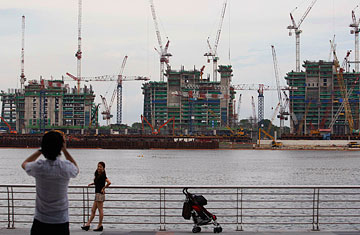
A tourist poses for a photo against a backdrop of the under-construction Marina Bay Sands casino in Singapore on Oct. 30, 2008
As afternoon storm clouds gather, an almost daily occurrence in wet and steamy Singapore, work goes on as usual at the Marina Bay site of Las Vegas Sands' $4 billion resort and casino project. The earthmovers scoop and dump the soft soil, and workers fan out across the city-state's most coveted piece of land, which girdles the central business district and offers a sweeping view over the emerald waters of the Malacca Straits.
But for the Las Vegas-based casino operator, a full-blown financial hurricane may be brewing. In a Nov. 5 filing to the Securities and Exchange Commission, Las Vegas Sands revealed its cash was drying up. For the first six months of 2008, according to the filing, the company's earnings were "insufficient to cover fixed charges" by $80.1 million. This gaping shortfall, astonishing for a company that was throwing off more than $600 million in free cash flow annually just three years ago, could trigger defaults on its $8.8 billion in long-term loans. That, in turn, could jeopardize Las Vegas Sands' ability to continue "as a going concern," according to the filing. (See 10 Things to Do in Singapore.)
Controlled by billionaire Sheldon Adelson, Las Vegas Sands is yet another high-flying company that has been caught out by the global credit crunch and crashing economy. Adelson, who is credited with helping to revitalize Las Vegas with his lavish Venetian and Palazzo resorts, has become a well known figure in Asia, where in recent years he has spent billions building new casinos and hotels in the Chinese enclave of Macau. When Singapore decided several years ago to boost its economy by becoming a tourist destination, the government of the conservative little city-state took the controversial step of legalizing gambling. Las Vegas Sands was tapped to build an anchor casino and resort complex on Marina Bay.
But with the U.S. economy entering recession, gamblers in Las Vegas are growing more reluctant to part with their money. Las Vegas Sands has also been grappling with an unexpected problem: China's government is increasingly alarmed by the profligacy and gambling debt of its citizens. China recently imposed visa restrictions on mainland tourists to Macau, reducing the anticipated cash flow from Las Vegas Sands' Asia operations. According to Daniel Renshaw, a Sydney-based gaming analyst with Merrill Lynch, these twin challenges will be difficult to surmount. "They are relying on an increase in revenue in Las Vegas and Macau over the long term," says Renshaw. "That seems to me a precarious position to be in." (See 10 Things to Do in Las Vegas.)
The 75-year-old Adelson, for his part, pledged to personally ensure the "success" of the Singapore casino. "In light of recent turmoil in the global markets," he said in a statement released Nov. 7, "I felt the need to personally reaffirm our commitment to the success of Marina Bay Sands." Apart from announcing that executives from Las Vegas Sands had met with officials from the Singapore government over the last week, however, the statement did not specify what steps are being taken to bolster the finances of his company or its Marina Bay project.
Analysts say the casino is too important for the economic diversification of Singapore, which is overwhelmingly dependent on electronics exports and trans-shipping, for it to collapse. The Singapore Tourism Board may step in either with an infusion of cash or an agreement to assume a sizable chunk of the troubled casino operator's debt. "We are working closely and are in dialogue with Marina Bay Sands [Las Vegas Sands' Singapore subsidiary] to facilitate the completion of the project," says Margaret Teo, Assistant CEO of the Singapore Tourism Board. She declined to provide further financial details.According to Las Vegas Sands' original proposal, the project, which is scheduled to open late next year, would include 2,500 hotel rooms, 1.2 million square feet of convention and exhibition space, an art and science museum, various theatrical venues, as well as a trio of linked marina-facing botanical gardens. Using the iconic structure as its main attraction, Singapore — which in September hosted the first Formula One Grand Prix race to be held at night — aims to double tourism arrivals to 17 million annually and triple its tourism receipts. "There is no doubt in my mind the Singapore government will come in to ensure the project is completed," says Merrill Lynch's Renshaw. "The government will not let it fail."
